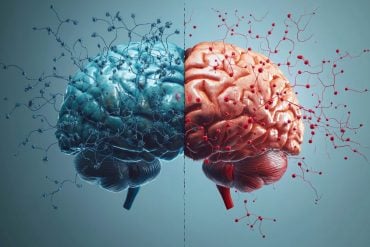Summary: Researchers have identified 84 potential inherited gene mutations that may contribute to the most severe forms of bipolar disorder.
Source: Johns Hopkins Medicine.
Using so-called next-generation genome sequencing, researchers at Johns Hopkins have identified 84 potential inherited gene mutations that may contribute to the most severe forms of bipolar disorder. About 5.6 million Americans are estimated to have bipolar disorder.
The investigators say their study is one of the first of rare genetic variations in people with bipolar disorder, which, in contrast to most previous studies of common variation, can provide a more direct insight into the biology underlying the susceptibility to bipolar disorder.
And the report on the work published on June 1 in JAMA Psychiatry, led by Fernando Goes, M.D., assistant professor of psychiatry and behavioral sciences at the Johns Hopkins University School of Medicine, affirms the need for DNA from a vast patient population to definitively confirm the role of rare mutations identified using the most advanced genome sequencing techniques.
“One thing we learned is that it will take genetic data from at least several thousand more people with bipolar disorder to confirm that these rare mutations do in fact directly cause the disease,” says Goes. “We are working with the Bipolar Sequencing Consortium to gather more data and collaborators so we can definitively figure out causes.”
Bipolar disorder is a mental illness characterized by periods of alternating episodes of severe depression and ecstatic mania, with the anguished person trying for a happy medium in the swinging pendulum of high and low moods.
Goes says some early genetic studies looking into the cause of the disease used genomewide association studies to search for common, single-letter DNA changes that individually turned out to have very small effects but, in combination, can explain a small proportion of the risk for bipolar disorder. Goes’ team used newer gene sequencing technology that instead can read millions of pieces of DNA at the same time to find even rarer genetic mutations that are rare but may have a more severe effect.
Initially, Goes’ team looked at eight families with a history of bipolar disorder through several generations, likely indicating a significant inherited component. Ultimately, the investigators sequenced the whole genomes of 36 family members with the disease. Examining only the portion of the genome that acts as protein blueprints, they identified 84 rare gene variations that stood out in these family members.

To further the case that these 84 variations were connected to the disease, they compared them to versions of the same genes found in 3,541 people with bipolar disease and 4,774 controls without the disease. Although many of these genetic variations were found to be overrepresented in the bipolar cases, the researchers caution that the data weren’t powerful enough to show that any specific mutation among the 84 rare mutations directly causes bipolar disorder, noting that patient sample sizes likely in excess of 10,000 cases will be necessary to pinpoint rare mutations within a specific gene. The study did find evidence that genes from this study had previously been implicated in other psychiatric disorders, such as autism and schizophrenia, which provides additional support for the overlap of autism and schizophrenia risk genes with risk genes in families with bipolar disorder.
“Once we can confirm that these rare mutations are associated with bipolar disorder in other samples, our plan will then be to integrate them with the more subtle, common mutations from the earlier genomic studies to better understand the cause of bipolar disorder,” says Goes.
According to the World Health Organization, bipolar disorder overall affects more than 60 million people worldwide and about 2.6 percent of adults in the U.S.
Additional authors include Mehdi Pirooznia, Yun-Ching Chen and Peter Zandi of The Johns Hopkins University; Jennifer Parla, Melissa Kramer, Elena Ghiban, Senem Mavruk and Richard MCombie of Cold Spring Harbor Laboratory; Eric Monson, Virginia Willour and James Potash of the University of Iowa; Matthew Flickinger, Adam Locke, Laura Scott and Michael Boehnke of the University of Michigan, Ann Arbor; Shawn Levy of the HudsonAlpha Institute of Biotechnology; Eli Stahl, Shaun Purcell and Pamela Sklar of Mount Sinai; Christina Hultman and Mikael Landen of the Karolinska Institute; and Jennifer Moran of the Broad Institute.
Funding: This study was funded by grants from the National Institute of Mental Health (grant numbers R00MH86049, K01MH093809, R01MH087992, MH09414501, MH105653 and R01MH087979).
Source: Vanessa McMains – Johns Hopkins Medicine
Image Source: This NeuroscienceNews.com image is in the public domain.
Original Research: Abstract for “Exome Sequencing of Familial Bipolar Disorder” by Fernando S. Goes, MD; Mehdi Pirooznia, MD, PhD; Jennifer S. Parla, PhD; Melissa Kramer, BS; Elena Ghiban, BA; Senem Mavruk, BA; Yun-Ching Chen, PhD; Eric T. Monson, BS; Virginia L. Willour, PhD; Rachel Karchin, PhD; Matthew Flickinger, PhD; Adam E. Locke, PhD; Shawn E. Levy, PhD; Laura J. Scott, PhD; Michael Boehnke, PhD; Eli Stahl, PhD; Jennifer L. Moran, PhD; Christina M. Hultman, PhD; Mikael Landén, MD; Shaun M. Purcell, PhD; Pamela Sklar, MD, PhD; Peter P. Zandi, PhD; W. Richard McCombie, PhD; and James B. Potash, MD, MPH in JAMA Psychiatry. Published online June 2016 doi:10.1001/jamapsychiatry.2016.0251
[cbtabs][cbtab title=”MLA”]Johns Hopkins Medicine. “Rare Inherited Mutations Linked to Bipolar Disorder.” NeuroscienceNews. NeuroscienceNews, 27 June 2016.
<https://neurosciencenews.com/genetic-mutation-bipolar-4578/>.[/cbtab][cbtab title=”Johns Hopkins Medicine”]Johns Hopkins Medicine. (2016, June 27). Rare Inherited Mutations Linked to Bipolar Disorder. NeuroscienceNews. Retrieved June 27, 2016 from https://neurosciencenews.com/genetic-mutation-bipolar-4578/[/cbtab][cbtab title=”Chicago”]Johns Hopkins Medicine. “Rare Inherited Mutations Linked to Bipolar Disorder.” https://neurosciencenews.com/genetic-mutation-bipolar-4578/ (accessed June 27, 2016).[/cbtab][/cbtabs]
Abstract
Exome Sequencing of Familial Bipolar Disorder
Importance Complex disorders, such as bipolar disorder (BD), likely result from the influence of both common and rare susceptibility alleles. While common variation has been widely studied, rare variant discovery has only recently become feasible with next-generation sequencing.
Objective To utilize a combined family-based and case-control approach to exome sequencing in BD using multiplex families as an initial discovery strategy, followed by association testing in a large case-control meta-analysis.
Design, Setting, and Participants We performed exome sequencing of 36 affected members with BD from 8 multiplex families and tested rare, segregating variants in 3 independent case-control samples consisting of 3541 BD cases and 4774 controls.
Main Outcomes and Measures We used penalized logistic regression and 1-sided gene-burden analyses to test for association of rare, segregating damaging variants with BD. Permutation-based analyses were performed to test for overall enrichment with previously identified gene sets.
Results We found 84 rare (frequency <1%), segregating variants that were bioinformatically predicted to be damaging. These variants were found in 82 genes that were enriched for gene sets previously identified in de novo studies of autism (19 observed vs. 10.9 expected, P = .0066) and schizophrenia (11 observed vs. 5.1 expected, P = .0062) and for targets of the fragile X mental retardation protein (FMRP) pathway (10 observed vs. 4.4 expected, P = .0076). The case-control meta-analyses yielded 19 genes that were nominally associated with BD based either on individual variants or a gene-burden approach. Although no gene was individually significant after correction for multiple testing, this group of genes continued to show evidence for significant enrichment of de novo autism genes (6 observed vs 2.6 expected, P = .028).
Conclusions and Relevance Our results are consistent with the presence of prominent locus and allelic heterogeneity in BD and suggest that very large samples will be required to definitively identify individual rare variants or genes conferring risk for this disorder. However, we also identify significant associations with gene sets composed of previously discovered de novo variants in autism and schizophrenia, as well as targets of the FRMP pathway, providing preliminary support for the overlap of potential autism and schizophrenia risk genes with rare, segregating variants in families with BD.
“Exome Sequencing of Familial Bipolar Disorder” by Fernando S. Goes, MD; Mehdi Pirooznia, MD, PhD; Jennifer S. Parla, PhD; Melissa Kramer, BS; Elena Ghiban, BA; Senem Mavruk, BA; Yun-Ching Chen, PhD; Eric T. Monson, BS; Virginia L. Willour, PhD; Rachel Karchin, PhD; Matthew Flickinger, PhD; Adam E. Locke, PhD; Shawn E. Levy, PhD; Laura J. Scott, PhD; Michael Boehnke, PhD; Eli Stahl, PhD; Jennifer L. Moran, PhD; Christina M. Hultman, PhD; Mikael Landén, MD; Shaun M. Purcell, PhD; Pamela Sklar, MD, PhD; Peter P. Zandi, PhD; W. Richard McCombie, PhD; and James B. Potash, MD, MPH in JAMA Psychiatry. Published online June 2016 doi:10.1001/jamapsychiatry.2016.0251






